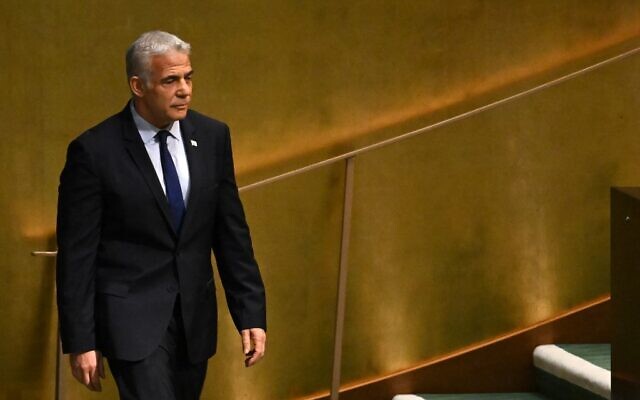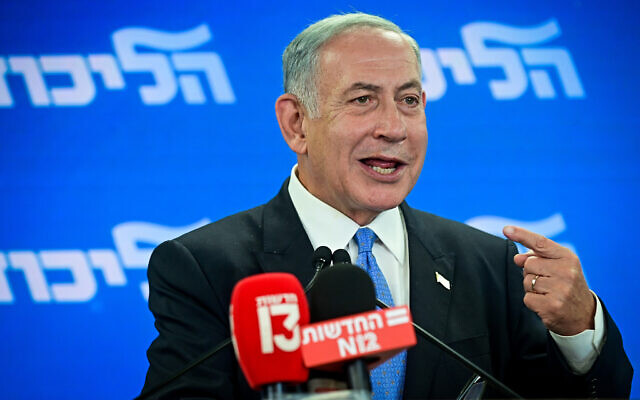Likud leader Benjamin Netanyahu on Monday accused Prime Minister Yair Lapid of bargaining away Israel’s “sovereign territory” in a potential agreement to resolve Israel’s long-running maritime border dispute with Lebanon.
Lapid, meanwhile, said the opposition leader was bitter for not reaching a deal when he was premier.
Speaking to reporters in Tel Aviv, Netanyahu reaffirmed his stance that the agreement “is illegal and we won’t be obligated by it,” should he return to power after the November 1 election.
The Likud chief charged that if the agreement — whose full details have not been made public — is signed, then the Lebanese terrorist group Hezbollah will be “receiving Israel’s sovereign territory and a gas field worth billions of dollars.”
Alleging that the agreement involves the transfer of sovereign territory, Netanyahu said it should have to be approved by at least 80 Knesset members or in a referendum to be valid. Lapid and the foreign ministry have said that the deal only concerns territory in Israel’s economic sphere, not territorial waters, and therefore does not require Knesset approval or a national referendum.
The issue of approval will likely be decided in the courts, with the High Court of Justice on Monday evening demanding that the government respond to a right-wing group’s petition seeking to block the caretaker government’s implementation of the deal without a parliamentary green-light.

Prime Minister Yair Lapid arrives to speak at the 77th session of the United Nations General Assembly at the UN headquarters in New York City on September 22, 2022. (TIMOTHY A. CLARY / AFP)
In his latest barbs with the Likud leader, Lapid on Monday accused Netanyahu of taking out his frustrations “on not reaching a deal during his 10 years in office” by sharing propaganda from Hezbollah chief Hassan Nasrallah.
Through an American intermediary, Israel has long been negotiating to resolve the maritime border dispute with Lebanon. The bulk of that took place under Netanyahu, who was prime minister from 2009 until 2021.
Commenting on the deal’s reported clauses, Netanyahu said that he would not recognize Lebanese sovereignty over the Qana gas field.
“I didn’t plan to give it up. [Lapid] came and gave it up, took our sovereign land and gave it away. I wouldn’t have done it,” the Likud leader told The Times of Israel.
“I don’t bow to demands or threats, and I don’t bow to an American request,” he continued.

Likud party chief Benjamin Netanyahu speaks to the media in Tel Aviv, October 3, 2022. (Avshalom Sassoni/ Flash90)
Meant to solve a maritime dispute that concerns the Karish and Qana gas fields, Lapid said the deal will cede Qana to Lebanon, but will deliver a yet-to-be-decided percentage of gas revenues to Israel.
The prime minister stressed that Israel will retain full control of the Karish gas field and its revenues. Karish has been threatened by Hezbollah in the months leading up to the expected start of production in the coming weeks.
In a briefing Sunday, a senior Israeli official argued that the deal is a security and diplomatic win for Israel, given the de facto maritime border with Lebanon, as created by a line of buoys it placed.
Without elaborating, Lapid said Monday “Israel will receive 100% of our security needs, as defined by the security community” through the deal.
The prime minister claimed that Netanyahu and his allies attacked the agreement “without them even seeing it or without them knowing what’s in it.”
Netanyahu, however, said that Lapid’s deal highly disfavored Israel.
“Former US ambassador to Israel David Friedman said today that Hezbollah got 100% and Israel got 0% and he is right. Lapid gave them the cake and barely left us crumbs,” Netanyahu said.
We spent years trying to broker a deal between Israel and Lebanon on the disputed maritime gas fields. Got very close with proposed splits of 55-60% for Lebanon and 45-40% for Israel. No one then imagined 100% to Lebanon and 0% to Israel. Would love to understand how we got here.
— David M Friedman (@DavidM_Friedman) October 3, 2022
Friedman, who was ambassador during the US’s tenure brokering Israel and Lebanon’s maritime dispute, tweeted that he thought Israel would not receive anything in the deal.
“No one then imagined 100% to Lebanon and 0% to Israel. Would love to understand how we got here,” Friedman wrote. He later followed up by tweeting that “I could be wrong, [but] I think Israel does get zero.”
I could be wrong, by I think Israel does get zero. My understanding is that Israel gets royalties only on drilling within its own sovereign territory — that’s beyond the scope of the maritime dispute with Lebanon. As to the disputed territory, I understand Lebanon gets it all. https://t.co/SNCBQIhiEg
— David M Friedman (@DavidM_Friedman) October 3, 2022
Likud lawmaker and former energy minister Yuval Steinitz — who formerly took part in the negotiations — said that the current agreement is “giving in to blackmail,” citing its purported terms. He also railed at the timing, telling Radio 103FM that a caretaker government’s approval of such an agreement before elections is akin to a “kidnapping.”
In August, Steinitz told The Times of Israel’s sister site Zman Yisrael that an agreement with Lebanon would not need to be brought to either the Knesset or a referendum for approval.

Then-prime minister Benjamin Netanyahu with then-energy minister Yuval Steinitz at the Prime Minister’s Conference on Fuel Substitutes in Tel Aviv, October 29, 2018. (Tomer Neuberg/Flash90/File)
“I do not accept this claim, that this is a waiver of sovereignty,” said Steinitz in a conversation with Zman Israel. “Economic waters are not sovereign waters, because other countries, including enemy countries, are allowed to sail in economic waters or fly over them. The claim that this is a waiver of sovereignty is unfounded in terms of international law.”
Maritime sovereignty is governed by the United Nations Convention on the Law of the Sea, which says coastal states – like Israel and Lebanon – has 12 nautical miles of territorial sovereign waters and a 200 nautical mile exclusive economic zone, which includes sovereign economic rights for natural resources.
Furthermore, Steinitz said that “when I managed the negotiations between Israel and Lebanon, I had no intention of bringing an agreement to the approval of the Knesset or a referendum.”
Asked how he reconciles his position with Steinitz and UNCLOS, Netanyahu said that he “always thought this thing needs to be brought” for Knesset approval if territory is “actually” being transferred.
In addition to attacking Lapid for “giving up” the gas field, Netanyahu argued that “handing over” the strategic asset has the potential to line Hezbollah’s pockets.
“There is a danger of Hezbollah arming itself, at the moment it’s gotten bigger. Hezbollah would receive billions to arm itself against us,” he told The Times of Israel.
“This is a shameful surrender under the threat of terrorism that will not buy us terrorism, but rather a war under much harsher conditions,” he added in his remarks. “We are in a dangerous period.”
Israel last fought against Hezbollah in the bloody 2006 Second Lebanon War and the Iranian-backed organization is considered to be the best armed and organized terror group on the Jewish state’s borders.
Lapid became premier in July, taking the reins from former prime minister Naftali Bennett when their power-sharing coalition collapsed. Bennett is reportedly weighing his opinion on the Lebanon deal, which Channel 13 reported on Monday differs from what he expected.
If the deal is brought to the government for a vote, Bennett would have the power to veto it, according to Channel 12.